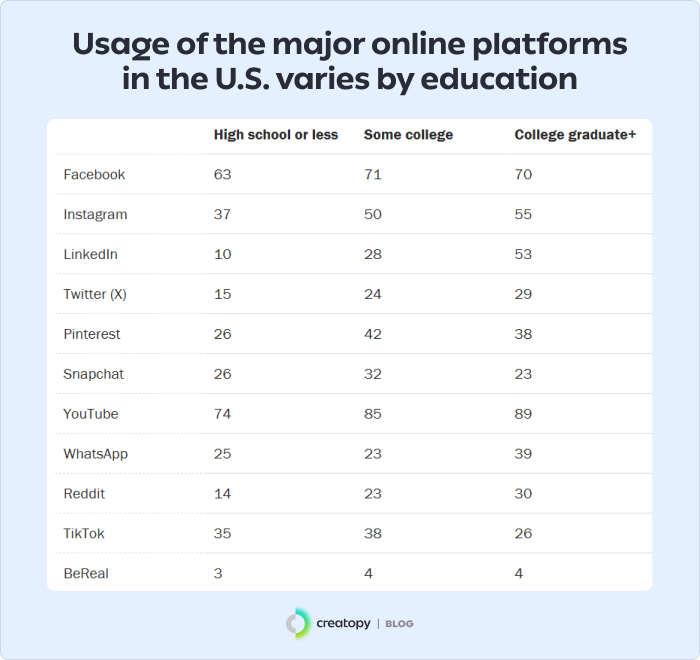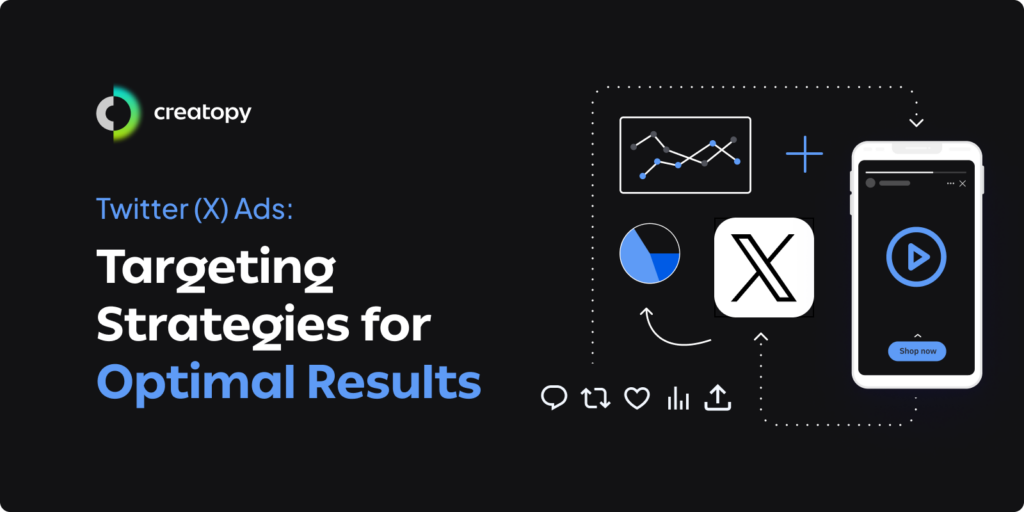Ad targeting provides businesses with powerful tools to reach their ideal audience on X, the platform formerly known as Twitter. According to Statista, X had over 429 million users worldwide in early 2024, with 106 million in the United States. This large user base gives advertisers many ways to make their campaigns more effective through careful targeting.
X’s advertising tools let businesses connect with users based on who they are, what they like, and how they use the platform. And what makes X unique for marketers is that 53% of users get their news from the platform. This means they are active and ready to engage with relevant content.
Pew Research shows that while YouTube and Facebook have more users overall, X is the one managing to draw people who actively follow current events. Those who are this engaged make the platform a great place for businesses to build their brands and get more sales.
Strategic approaches to Twitter (X) ad targeting for optimal results
Understanding audience demographics
X has specific types of users that make it valuable for advertisers. According to a survey released in September 2024, Statista reports that 61% of users are male, and many are from Generation Z. They usually have higher incomes and live in cities, making X perfect for brands selling to young, wealthy customers.
These patterns help businesses create better messages and targeting plans. City users often respond well to trending topics and timely marketing, and the platform’s wealthy users tend to engage more with high-end products and sophisticated services.

Core targeting options on X
Demographic targeting
X lets marketers choose their audience very precisely using different factors. You can target specific places, from whole countries down to individual zip codes. This is ideal for local businesses to focus their spending on nearby areas, while big brands can change their messages for different regions.
Language targeting supports 46 languages, encouraging businesses to talk to users in their preferred language. This helps with international campaigns and areas where people speak multiple languages.
Another interesting aspect is that the system’s language detection goes beyond simple profile settings; it also analyzes user behavior to identify multilingual users who might engage with content in multiple languages.
As for age targeting, it lets businesses match campaigns to specific age groups. You can pick exact age ranges to reach people when your products matter most to them. And yes, X uses both what users tell it and how they act to get age targeting right.
Interest-based targeting
The platform looks at what users do to group them by interests. It sees what topics they discuss, who they follow, and what content they like to create detailed user profiles. This helps advertisers reach users who really care about relevant topics.
X offers 25 main interest categories with over 350 specific subcategories. These range from broad topics like tech and entertainment to specific interests like particular sports teams or music types. You can mix multiple interests to reach exactly the right audience for your brand.
Setting up your first X ad campaign
Creating a well-targeted campaign on X needs careful planning. Here’s how to set up your campaign:
Step 1: Choose your campaign objective
Go to “Ads Manager” and click “Create Campaign.” Pick a goal like awareness, consideration, or conversion. Choose “Reach” to build brand awareness or “Website Clicks” to get more website visitors.
Step 2: Select your targeting criteria
After naming your campaign and setting basic parameters, don’t hesitate to move to the audience targeting section. Start with core demographics by selecting your target locations, languages, and age ranges—next, layer on interest-based targeting by choosing relevant categories and subcategories.
Make sure to use behavioral targeting options like follower look-alikes or engagement targeting to further refine your audience.
Step 3: Exclude irrelevant audiences
Find the audience exclusion settings in the campaign setup. Remove groups that might make your campaign less effective. You might exclude competitor followers, current customers (for new customer campaigns), or people who have already bought. Use custom audiences to upload lists of users to exclude.
Step 4: Turn on automated targeting
Find automated targeting in campaign settings. Turn it on to let the platform find users similar to your chosen audience. Set limits on how broadly X should expand your targeting, and watch results to adjust these settings.
Advanced targeting strategies
Better social media targeting combines multiple methods for more effective campaigns. Custom audiences work well as a starting point, but you must upload customer emails to create base audiences and find similar users who share traits with your best customers.
Even more, website visitor targeting through the X Pixel helps retarget users who have shown interest in your products or services. Make sure to implement the Pixel across your site and create audience segments based on specific page visits or user actions. Then, combine these audiences with interest-based targeting to reach similar users who haven’t yet discovered your brand.
Also, using Creatopy’s ad design platform with X’s targeting makes creating ads easier while keeping precise audience targeting. Its automation and X image post templates help everyone in your company make eye-catching ads for each audience group, saving time and improving results
Measuring and optimizing target audiences
Good targeting needs constant checking and improvement based on results. Track important numbers like engagement rates, cost per engagement, and conversion rates across different audiences, and watch how different targeting combinations work over time.
And only regular analysis shows which targeting works best. Remove or change poor-performing groups and do more of what works well. Think about when ads run, what devices people use, and how they behave when improving your targeting.
Cost considerations and budget management
In order to manage campaign spending, you need to understand how different targeting affects costs. According to Statista, X has 67 million active users in the European Union, offering great reach. More specific targeting might cost more but can lead to better conversion rates.
Therefore, you should start with small test budgets across different targeting types. Watch the results closely, adjust spending based on what works, and try automated bidding to manage costs while keeping campaigns effective.
Also read:
- 7 Must-Try Instagram Target Audience Practices for Strategic Success
- 5 Strategic Tips for Effective Facebook Ad Targeting
- Snapchat Ad Targeting: 7 Strategies for Maximizing Audience Engagement
- Optimize Your Pinterest Ad Targeting: Expert Tips and Strategies
- LinkedIn Ad Targeting: Proven Tips for Better Campaigns
Success with X advertising depends on good targeting setup and ongoing improvement. Following these targeting strategies helps advertisers connect with their ideal audience while managing costs effectively. And remember: good targeting needs regular checking and adjusting based on performance data!
